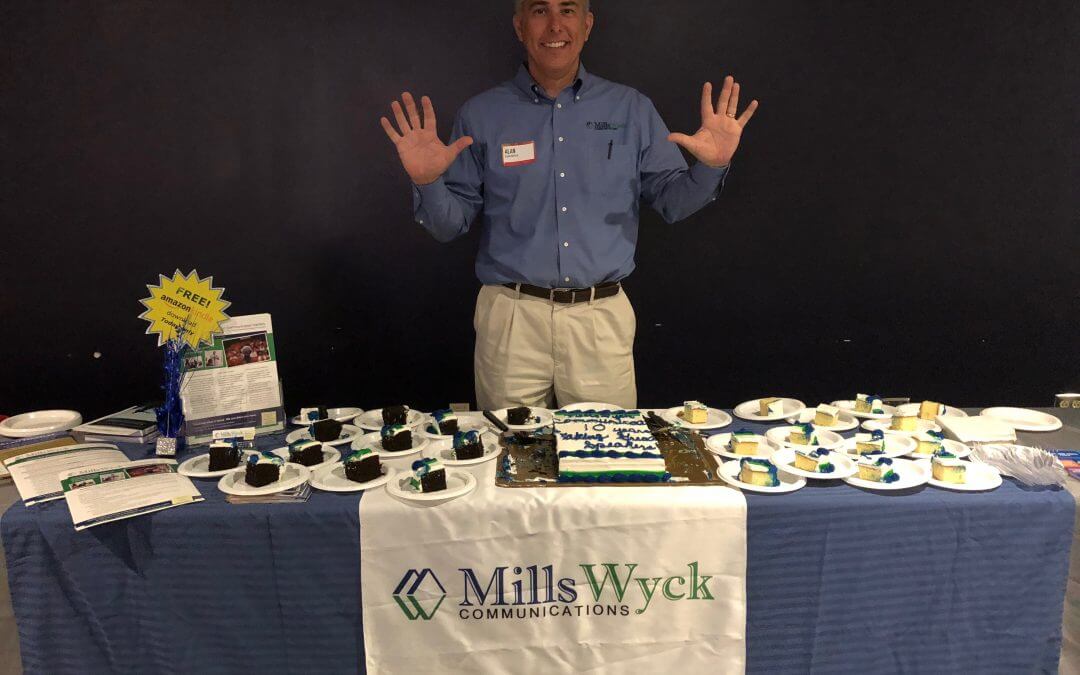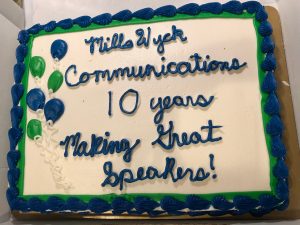We just passed a milestone anniversary here at MillsWyck Communications. It was just over ten years ago that I said goodbye to my corporate job at (what was then) America’s Best Place to Work and the steady paycheck to become a public speaking trainer. I was convinced that my passion to teach and the few nuggets I felt worthy of sharing would convince others it was worth paying me (now us) to help them become world-class speakers. It seems like a long time ago.
While I’ve never missed a mortgage payment, my family has eaten every meal, and I am blessed beyond my wildest imaginations, the difficulty in running a business surprised (and still surprises) me. While I married into an entrepreneurial family with a high tolerance for risk, my own discomfort coupled with the economic environment I stepped into in 2008 has made this much more difficult than I imagined.
Here are a few nuggets I have learned about business through being a consultant-speaker-trainer-business owner for the past 10 years:
- No one else will ever care as much as you do about your passion.
- If people don’t pay you for your expertise, you have a hobby, not a business.
- Life and business have far more details than you are qualified to handle. Get help.
Along the way, I’ve learned a lot more about speaking as well. When I began the business, I had done enough research and learned a bit from some masters that gave me a curriculum and a product I felt was worth selling. But very quickly I observed that speaking is not an intellectual endeavor that relies on knowledge. It is a SKILL that thrives on focused practice and is more governed by culture and habit than any compilation of intellectual wisdom.
I now have adopted a few core tenets that seem to apply to most every speaker I observe or coach.
Here are the Top 3 Tips I’ve gleaned in a decade of being a public speaking trainer and coach:
- Have a point and share it clearly. A point is different from facts, knowledge, or data. Far too often – especially with high knowledge workers like engineers, scientists, and leaders of any type – speakers confuse sharing what they know with having a point. One of the reasons this is difficult for people my age (that used to mean “young” – now it means “experienced”) is that we grew up watching (and thus believing) that knowledge really mattered. It used to be that the only people with knowledge were those that had studied. A college education meant you knew something no one else did. Now, everything man has ever known is available to anyone who can get to a public library or owns a smartphone. MIT puts all their lectures online for FREE. Your audience can Google your topic and learn more facts reading their phone than listening to you. Anyone can get knowledge; what people need is insight and wisdom. And what they want is to be entertained (have their mind captured). That’s where you come in. Tell me what that data means (to me); share how I can use that fact in my life; make it more fun to listen to you than to read Wikipedia. (And never run over time!)
- The specific is more powerful than the generic. Somewhere along the way, I noticed that most speakers overuse worn-out clichés and generalities, but seldom give details that matter. Drop the terms “thing”, “stuff”, “issue”, “problem.” Instead, use specific examples that your audience is likely to connect to. (Read my past article on How to engage your audience: Be specific.) This engages their brain, gets them thinking about the topic, and makes you more relatable. I was recently coaching a graduation speech that discussed the “struggles” that each graduate had overcome. We dropped in specific struggles (money, time, motivation, purpose) and uncovered a theme that helped the rest of the speech as well. It’s easy to be cheesy; being exact gives you impact.
- Rule #1 is still Rule #1. Your speaking is not, nor will it ever be, about you. I’ve had students and clients challenge me on everything from how to open a speech to how to ask questions to how long they should talk. But no one has ever (successfully) argued that putting the audience first is a bad way to approach speaking. Any time I stumble or get stuck in preparation, reminding myself of this important cornerstone always leads me out the morass and to the purpose of my talk.
Thank you for being a part of this stage of my journey as a public speaking trainer and coach. Using my talents and gifts to push others to have impact on the stage of life gives me great joy. I’m as energized (and nervous) about what I do now as I was ten years ago. My mind is always dreaming and thinking of how to make our influence greater and our expertise easier to consume. May the next ten years as a public speaking trainer and coach bring even more lessons that others can benefit from.
What insight do you possess that needs to be shared!?
Oh, and 22 years ago today I experienced another momentous day! Happy anniversary to my partner in this journey of life, business, and parenthood. Haley is a God-given gift and the perfect complement to my stream-of-consciousness style to living.
Communication matters, what are YOU saying?
This article was published in the June edition of our monthly speaking tips email newsletter, Communication Matters. Have speaking tips like these delivered straight to your inbox every month. Sign up today and receive our FREE eBook, “Twelve Tips that will Save You from Making a Bad Presentation.” You can unsubscribe at any time.




